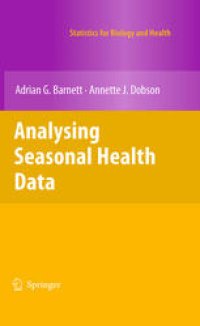
Ebook: Analysing Seasonal Health Data
- Genre: Computers // Organization and Data Processing
- Tags: Statistics for Life Sciences Medicine Health Sciences, Statistics general, Environmental Health
- Series: Statistics for Biology and Health
- Year: 2010
- Publisher: Springer-Verlag Berlin Heidelberg
- Edition: 1
- Language: English
- pdf
Seasonal patterns have been found in a remarkable range of health conditions, including birth defects, respiratory infections and cardiovascular disease. Accurately estimating the size and timing of seasonal peaks in disease incidence is an aid to understanding the causes and possibly to developing interventions. With global warming increasing the intensity of seasonal weather patterns around the world, a review of the methods for estimating seasonal effects on health is timely.
This is the first book on statistical methods for seasonal data written for a health audience. It describes methods for a range of outcomes (including continuous, count and binomial data) and demonstrates appropriate techniques for summarising and modelling these data. It has a practical focus and uses interesting examples to motivate and illustrate the methods. The statistical procedures and example data sets are available in an R package called ‘season’.
Adrian Barnett is a senior research fellow at Queensland University of Technology, Australia. Annette Dobson is a Professor of Biostatistics at The University of Queensland, Australia. Both are experienced medical statisticians with a commitment to statistical education and have previously collaborated in research in the methodological developments and applications of biostatistics, especially to time series data. Among other projects, they worked together on revising the well-known textbook "An Introduction to Generalized Linear Models," third edition, Chapman Hall/CRC, 2008. In their new book they share their knowledge of statistical methods for examining seasonal patterns in health.
Seasonal patterns have been found in a remarkable range of health conditions, including birth defects, respiratory infections and cardiovascular disease. Accurately estimating the size and timing of seasonal peaks in disease incidence is an aid to understanding the causes and possibly to developing interventions. With global warming increasing the intensity of seasonal weather patterns around the world, a review of the methods for estimating seasonal effects on health is timely.
This is the first book on statistical methods for seasonal data written for a health audience. It describes methods for a range of outcomes (including continuous, count and binomial data) and demonstrates appropriate techniques for summarising and modelling these data. It has a practical focus and uses interesting examples to motivate and illustrate the methods. The statistical procedures and example data sets are available in an R package called ‘season’.